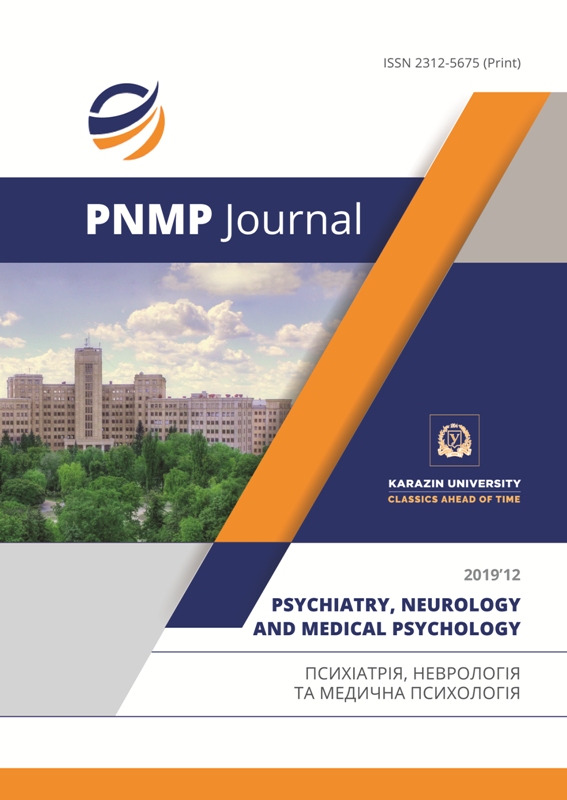Cognitive functions in a mixed episode of bipolar affective disorder
Abstract
Summary. According to various meta-analyzes, most patients with bipolar affective disorder have neurocognitive dysfunction even in remission. In recent studies, moderate to severe impairments have been found in attention, verbal learning and memory, and executive function. Whereas premorbid intelligence remains unchanged. The main body of research is devoted to the study of cognitive impairment in the first episode of bipolar affective disorder, in manic, depressive episodes, and euthymia. At the same time, the features of cognitive dysfunction in mixed forms of bipolar affective disorder remain poorly understood.
The aim of the study was to study the characteristics of cognitive functions in patients with a mixed episode of bipolar affective disorder.
Materials and methods. With the help of a battery of tests (a test for remembering ten unrelated words; a Ray-Osterritz test; a verbal speed test; a digital character substitution test; a symbol linking test), the cognitive features of 25 patients with a mixed episode, 16 patients with a manic episode, and 15 patients with a depressive episode of bipolar affective disorder.
Results and conclusions. Deviations in cognitive function were found in all patients regardless of the type of affective symptomatology. In the form of a wide range of psychopathological phenomena which manifested themselves to a greater extent in patients with a mixed episode of bipolar affective disorder. The peculiarities of the phenomenological structure of cognitive impairment in patients with mixed phase of bipolar affective disorder are manifested in the form of a more pronounced deterioration of verbal memory, information processing speed; more pronounced violations of spatial representations, deterioration of visual memory, verbal associative performance and executive functions; a decrease in attention and a violation of its distribution. The findings suggest that the leading role in the formation of these disorders is played by the presence of depressive symptoms in the clinical structure of affective disorders.
Downloads
References
Bortolato B., Miskowiak K. W., Köhler C. A., et al. Cognitive dysfunction in bipolar disorder and schizophrenia: a systematic review of meta-analyses. Neuropsychiatric Disease and Treatment. 2015, vol.11.pp. 3111-3125.
Bora E., Pantelis C. Meta-analysis of Cognitive Impairment in First-Episode Bipolar Disorder: Comparison With First-Episode Schizophrenia and Healthy Controls. Schizophrenia Bulletin. 2015, – vol. 41. issue 5. pp. 1095-1104. . vol. 23. pp. 1337–1339.
Solé B., Jiménez E., Torrent C., et al. Cognitive variability in bipolar II disorder: who is cognitively impaired and who is preserved. Bipolar disorder. 2016, vol. 18 (3). pp. 288-299.
Serna E., Vila M., Sanchez-Gistau V. Neuropsychological characteristics of child and adolescent offspring of patients with bipolar disorder. Progress in Neuro-Psychopharmacology and Biological Psychiatry. 2016, vol. 65. pp. 54-59.
Robinson L.J., Thompson J. M., Gallagher P., et al. A meta-analysis of cognitive deficits in euthymic patients with bipolar disorder. Journal of Affective Disorders. 2006, vol.93. issue 1-3. pp. 105-115.
Bora E. Differences in cognitive impairment between schizophrenia and bipolar disorder: Considering the role of heterogeneity. Psychiatry and Clinical Neurosciences. 2016, vol. 70 (10). pp. 424-433.
Samame C., Martino D. J., Strejilevich S. A. Longitudinal course of cognitive deficits in bipolar disorder: a meta-analytic study. Journal of Affective Disorders. 2014, vol. 164, pp. 130-138.
Catalá-López F., Gènova-Maleras R., Vieta E., et al. The increasing burden of mental and neurological disorders. European Neuropsychopharmacology, 2013, vol. 23, pp 1337–1339.
Bora E., Yucel M., Pantelis C. Cognitive endophenotypes of bipolar disorder: a meta-analysis of neuropsychological deficits in euthymic patients and their first-degree relatives. Journal of Affective Disorders. 2008, vol. 113. – pp. 1-20.
Khomskaya, Ye.D. Neyropsikhologicheskaya diagnostika. Skhema neyropsikhologicheskogo issledovaniya vysshikh psikhicheskikh funktsiy i emotsional'no-lichnostnoy sfery. [Neuropsychological diagnosis. Scheme of neuropsychological research of higher mental functions and emotional-personal sphere]. 2007, p 93 [In Russian].

